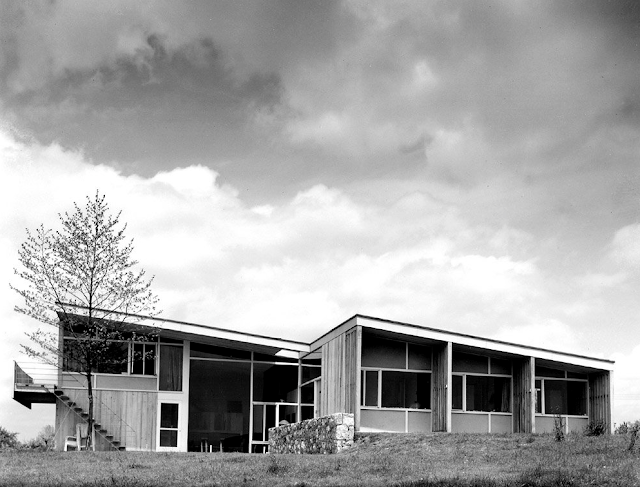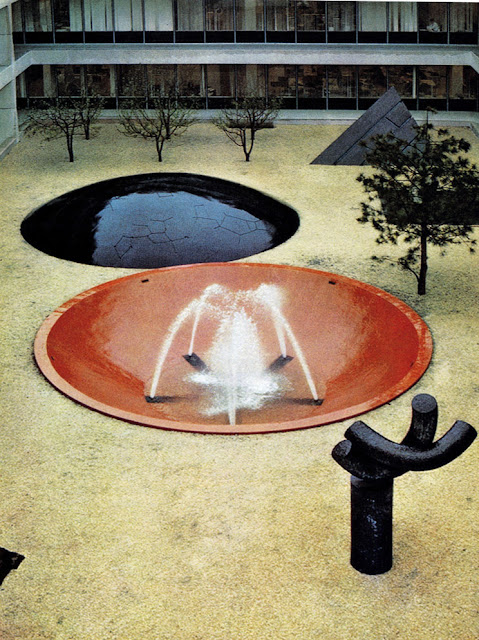
Noyes probably doesn't pop into your head when thinking about modern architecture and design heroes —
even though he was actually a major figure in the modern design movement. He defined the NY MoMA's design program
in the 1940's —he actually created the definition for "Good Design" and produced some of the most important
exhibitions relating to modern design, like Organic Design in Home Furnishing. He also brought Paul Rand and the
Eames (along with several other major figures) to IBM. He was the father of corporate design identity
in modern America, first with IBM, then with Westinghouse and Mobil. Basicaly, he was a big deal.
Image: Rowe

Noyes was heavily influenced by the Bauhaus, which is not surprising since he studied architecture at Harvard under Bauhaus
founder Walter Gropius. Josef Albers and Marcel Breuer were also teaching at Harvard during that time. In fact, Noyes
worked for Breuer and Gropius' architecture firm shortly after graduating.
This photo is a reflection of Eliot and his wife at Frank Lloyd Wright's Fallingwater in 1939. There were on a cross-country
trip funded by a Wheelwright Travelling Fellowship he received from Harvard. This was the vacation home
built for Edgar Kaufmann Sr. His son, Edgar Kaufamn Jr. would be a strong supporter of Noyes and the design program at MoMA.
Source: Eliot Noyes: A Pioneer of Design and Architecture in the Age of American Modernsim

Noyes was the first Director of Industrial Design at MoMA in 1939. He held that position until 1946.
Source: Eliot Noyes: A Pioneer of Design and Architecture in the Age of American Modernsim
Source: Eliot Noyes: A Pioneer of Design and Architecture in the Age of American Modernsim

Noyes was responsible for the first-ever design exhibition at MoMA, “Useful Objects of American Design Under $10”
Source: Eliot Noyes: A Pioneer of Design and Architecture in the Age of American Modernsim

The definition of "Good Design" Eliot Noyes created for the “Useful Objects of American Design Under $10”
Source: Eliot Noyes: A Pioneer of Design and Architecture in the Age of American Modernsim
MoMA Organic Design Competition, 1941
Eames and Saarinen won for the "seating," and "other furniture" in the living room categories.

1942 Christmas card from Chalres and Ray to Eliot talking about "compound curve" wood splints. "They are good looking in a way."
The Noyes and Eames would be lifelong friends. He was one of the few people who owned a Eames splint sculpture.
More about that here.
Image: Eliot Noyes: A Pioneer of Design and Architecture in the Age of American Modernsim
"There is no need to qualify the statement. Charles Eames has designed and produced the most
important group of furniture ever developed in this country. His achievement is a compound of
aesthetic brilliance and technical inventiveness. He has not only produced the finest chairs of
modern design, but through borrowing, improvising, and inventing techniques, he has for the first
time exploited the possibilities of mass production methods for the manufacture of furniture."
Eliot Noyes, "Charles Eames," Arts & Architecture (September 1946)

Kniffen House, New Canaan, CT, Marcel Breuer and Eliot Noyes, 1949
Photo: Wayne Andrews via trimoca

Family Ski House, Sherburne, VT, Eliot Noyes, 1961. This is one of several houses Noyes designed for his family over the years.
Source: Eliot Noyes: A Pioneer of Design and Architecture in the Age of American Modernsim

In 1956, after seeing the comprehensive and slick deign of Olivetti on a trip to Italy, IBM CEO and President Thomas Watson Jr. hired Noyes as as the company's design consultant. His task was to "…oversee the redesign of the corporation’s products and buildings in order to convert a technologically unified ‘family’ into a visually unified one” Noyes: “In a sense, a corporation should be like a good painting; everything visible should contribute to the correct total statement; nothing visible should detract”
Source: Eliot Noyes: A Pioneer of Design and Architecture in the Age of American ModernsimTo do this, Noyes put together a team of consultants. This group included Paul Rand, Charles and Ray Eames, George Nelson, Edgar Kaufman Jr., Alexander Calder and Isamu Noguchi. Not a bad team at all.
(Also see the 1964 World's Fair IBM Pavilion)

Image: Modern Design

Image: Bruce Coleman

Source: George Nelson: Architect, Writer, Designer, Teacher

IBM Dictating Machine Stand by William Plumb of the Eliot Noyes office.
Source: Wright

Noyes designed the IBM Aerospace building in Los Angeles, 1963.
A Quincy Jones and Frederick Emmons were associate architects on the project.
It's now home to Otis College of Art & Design
Source: Eliot Noyes: A Pioneer of Design and Architecture in the Age of American Modernsim
Noyes made a mock up of the punch card window at his own house in Connecticut

Noyes also went on to manage Westinghouse's corporate identity. Paul Rand did that logo too.
Here is Noyes with his model for the Westinghouse Pavilion at the 1964 New York World'd Fair. It was never built.
Source: Eliot Noyes: A Pioneer of Design and Architecture in the Age of American Modernsim

Source: SFMoMA

Remember these Mobil stations? Yep, those are by Noyes too.
Source: Eliot Noyes: A Pioneer of Design and Architecture in the Age of American Modernsim

When Noyes needed his personal design work in 1959, he again went to Paul Rand.
Source: Paul Rand
The cover of Eliot Noyes: A Pioneer of Design and Architecture in the Age of American Modernsim (which is
a really good book) is the perfect illustration of how central he was in the making of modern America.
